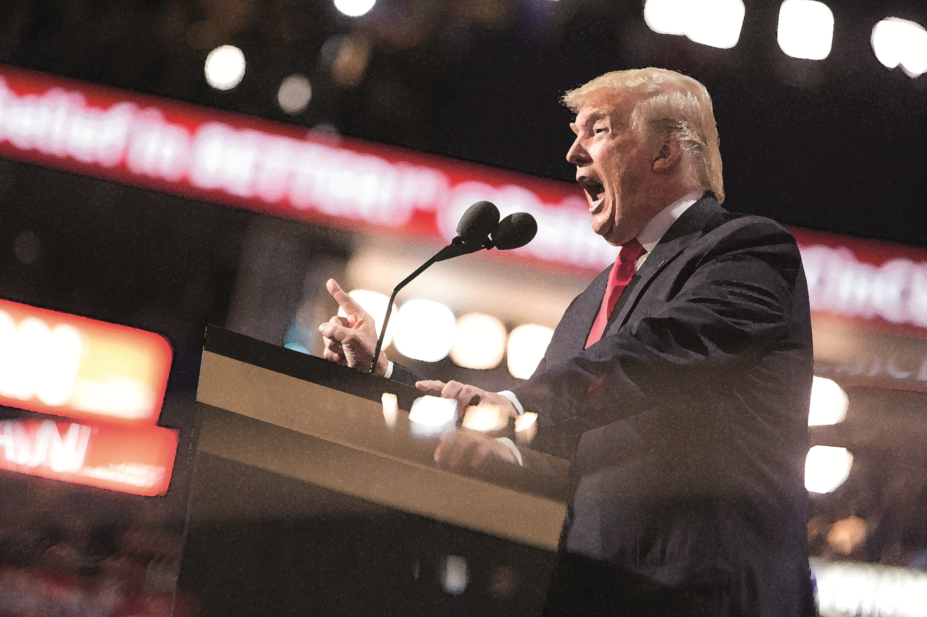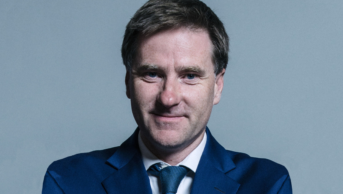
Philip Scalia / Alamy Stock Photo
On 9 November 2016, the world woke up to the news that Donald Trump had been elected the 45th president of the United States. I arrived to my morning lectures at Harvard TH Chan School of Public Health, Boston, Massachusetts, to find colleagues in tears and the university offering free food and counselling to distraught students. I began to discuss with colleagues what Trump’s win would mean for healthcare in the United States when I got an alert on my mobile phone telling me that the stock market was up, with pharma stocks rallying[1]
. One wonders why, inside a school of public health, it felt as though the world had come to an end and yet, a few hundred miles down the coast, the industries with which we work were responding positively to the election result.
How the political process works in the United States
Before we start to look at the implications of Trump’s win, it is important to understand a little about the US political system and the Affordable Care Act (‘Obamacare’), which was signed into law in 2010.
The separation of powers between the Executive (president, vice president and federal departments) and legislative (House of Representatives and Senate) branches of government was written into the US Constitution in order to provide a series of checks and balances whereby the powers of one branch can be challenged by another. Unfortunately, in recent times, the ever increasing partisanship in Washington has resulted in the separation of powers being used to block the advancement of any policy whatsoever that is proposed by those from opposite ends of the political spectrum. As a result, fewer laws than usual have been enacted in recent years[2]
. However, not only did Trump win the presidency, but the Republican Party also held on to majorities in the Senate and House of Representatives, meaning that, for the first time since 2008, the stars have aligned for serious legislative changes.
Obamacare: heading for the chop
To understand the implications of the recent presidential and congressional elections on US health policy, it is essential to know the background of Obamacare. Healthcare reform had been a focus of the 2008 US presidential election campaign because there had been a growing consensus that the US healthcare system was failing. Through Obamacare, over 20 million more Americans have health insurance[3]
. Central provisions of the law include:
- Systemic reform of health insurance (introduced the requirement for health insurers to issue coverage irrespective of a prospective enrollee’s medical history);
- Individual mandate to purchase health insurance (mandated that all Americans purchase health insurance or be penalised through taxation and attempted to make policies ‘affordable’ through creation of health insurance exchanges);
- Expansion in population covered by the safety-net Medicaid programme;
- Reform of the medical care delivery system.
A complete repeal of Obamacare is a definite possibility. Ever since the controversial legislation was enacted, Republicans across the country have sought its complete repeal and many candidates have run for office on a single-issue platform: to repeal Obamacare. There are a myriad of reasons Republicans wants Obamacare gone. For example, they claim that it drives up the amount of money healthcare providers have to spend to offer more services for more people. Also, they believe the policy was tailored to hide private-sector expenses from the federal budget that made Obamacare seem cheaper than what it actually was.
A full repeal of Obamacare is likely
Republicans began to lay the groundwork against Obamacare in 2015 when both the Senate and the House passed a bill that took apart central provisions. At the time, it did not matter because Obama vetoed it, but it showed that the Republicans are serious about this and that there is a legislative path forward. Whether Congress will vote to take away health insurance from the 20 million Americans who thanked President Obama for their coverage is uncertain. Trump has recently backtracked a little on his campaign stance of complete repeal of Obamacare, stating that there are two aspects he wishes to keep[4]
. These include allowing children to remain on their parents’ health insurance up to the age of 26 years and maintaining the requirement for health insurers to issue coverage irrespective of an applicant’s medical history. However, the only way in which insurance companies are able to afford these two provisions is through another essential tenet of Obamacare — the requirement for all Americans to purchase insurance — which Trump wants to dismantle. So, it is difficult to see how this would work. Instead, full repeal is likely.
President-elect Trump’s plans for a replacement of Obamacare are vague. Furthermore, there have been at least eight substantive replacement packages brought forward by Republicans in Congress[5]
. So, while Republicans are united in their desire to repeal Obamacare, that sense of unity is lacking in their thinking about how to replace it. All Republican plans include some form of financial support to help consumers pay insurance premiums, although there is no consensus on the form of that support. Most plans include expansion of high-deductible health savings accounts, as well as allowing the sale of insurance across state lines. By allowing this, Trump hopes that, as the number of insurers increases, prices will be driven down.
Pharma prefers Trump to Clinton
The explanation for why pharma share prices soared after Trump’s victory may lie in what Trump has not said rather than what he has said. While Democratic nominee Hillary Clinton made pharmaceutical pricing reform a central pillar of her election campaign, suggesting levying fines on drug companies that increase prices and capping patients’ out-of-pocket costs for specialty drugs,[6]
Trump largely kept quiet on drug prices. His victory, therefore, substantially diminishes the likelihood of significant pricing reform. Trump supports reform of the US Food and Drug Administration (FDA) — the federal agency that regulates the pharmaceutical industry — and hopes to speed up the approval of nearly 4,000 drugs that are currently being reviewed.
Trump’s victory substantially diminishes the likelihood of significant drug pricing reform
But if Trump is seemingly on the side of the pharmaceutical industry, what about rising drug prices? Reports suggest that spending on prescription drugs rose by 12.6% in 2014 and is expected to rise by at least 7.3% per year until 2018[7]
. A recent Kaiser Family Foundation survey found that making sure high-cost drugs for chronic conditions are affordable for those who need them is the public’s highest healthcare priority[8]
. More alarmingly, survey results from Families USA show that one in four people with full health insurance coverage forgo needed healthcare on account of its cost, with one half of these patients finding prescription drugs unaffordable[9]
. While Trump may not see this as a priority in his first year in office, the issue will not go away, and with Republicans in Congress seeking to limit federal spending, pricing reform may be on the cards in the latter parts of the Trump presidency. There are two main options being discussed.
The first option is to allow Medicare, the federal health insurance programme for older people, to negotiate directly on price with drug manufacturers. This is unlikely to be favoured by Trump and is unlikely to be successful in lowering drug prices. Both Clinton and fellow Democrat Bernie Sanders were strong proponents of this option. Before 2003 and the Medicare Modernization Act, Medicare lacked a prescription drug benefit. In an attempt to attract the support of market-oriented Republicans needed to pass the bill, a non-interference clause was added to the legislation that banned negotiations between Medicare and pharmaceutical companies[10]
. Instead of the government negotiating, individual prescription drug plans would compete for enrollees and negotiate directly with manufacturers. In theory, if the federal government could negotiate with pharmaceutical companies, the government could leverage its purchasing power to pay less for drugs. However, successful negotiation is possible only when there is an ability to limit coverage or utilisation of a drug when the price is unreasonable. Current Medicare law does not permit this for many classes of drugs. Medicare rules require drug plans to cover all or substantially all medicines under six protected classes in order to make sure the drug plans cover older patients who need these medicines. Without the ability to say ‘no,’ Medicare’s leverage with pharmaceutical companies would be weak, even if it could negotiate directly with manufacturers.
The alternative is to enhance competition and increase price transparency, particularly in the generic market, to drive prices down. This option is likely to be favoured by Trump and will be somewhat successful in lowering drug prices.
Trump used campaign speeches to describe his wish to remove barriers to entry in the market for drug providers that offer safe, reliable and cheaper products. Through FDA reform, he is likely to speed up the approval of generics which, when placed on the market, will lower prices through market forces. Trump has also supported increased pharmaceutical price transparency to enable greater competition. Of particular concern to the pharmaceutical industry, however, is Trump’s plan to allow the importation of generic drugs from abroad, where they are less expensive. The pharmaceutical lobby argues that such a move would limit work on innovative new therapies.
All change
So, while the pharmaceutical industry tries to work out whether the new administration will be friend or foe, what is beyond dispute is that we will see big changes in the way healthcare is delivered in the United States as a direct consequence of Trump’s victory. In a campaign that had, in truth, little to do with policy, health policy is likely to be the area most affected by the result. Whether or not Trump’s plan to make America great again includes the provisions necessary to fix the broken US healthcare system remains to be seen.
William Seligman is a British physician. He completed Foundation Programme training in the Severn region before embarking on the Master of Public Health program in health policy at the Harvard T.H. Chan School of Public Health. He was previously a legislative intern in the United States Senate and co-chair of the British Medical Association’s Medical Students’ Committee.
References
[1] Fortune. Pharma stocks are soaring after Trump’s victory. 9 November 2016. Available at: http://fortune.com/2016/11/09/trump-victory-pharma-stocks/ (accessed 27 November 2016).
[2] Brookings Institution. Vital statistics on Congress. Chapter 6: legislative productivity in Congress and workload. Available at: https://www.brookings.edu/wp-content/uploads/2016/06/Vital-Statistics-Chapter-6-Legislative-Productivity-in-Congress-and-Workload_UPDATE.pdf (accessed 27 November 2016).
[3] U.S. Department of Health and Human Services (2016). 20 million people have gained health insurance coverage because of the Affordable Care Act, new estimates show. 3 March 2016. Available at: http://www.hhs.gov/about/news/2016/03/03/20-million-people-have-gained-health-insurance-coverage-because-affordable-care-act-new-estimates (accessed 27 November 2016).
[4] Abelson R. Donald Trump says he may keep parts of Obama health care act. The New York Times. 11 November 2016. Available at: http://www.nytimes.com/2016/11/12/business/insurers-unprepared-for-obamacare-repeal.html (accessed 27 November 2016).
[5] McDonough J & Fletcher M. What would Republicans do instead of the Affordable Care Act. Health Affairs Blog. 18 September 2015. Available at: http://healthaffairs.org/blog/2015/09/18/what-would-republicans-do-instead-of-the-affordable-care-act/ (accessed 27 November 2016).
[6] Hillary for America. Hillary’s plan to respond to unjustified price hikes for long-available drugs. Available at: https://www.hillaryclinton.com/briefing/factsheets/2016/09/02/hillarys-plan-to-respond-to-unjustified-price-hikes-for-long-available-drugs/ (accessed 27 November 2016).
[7] Wall Street Journal. How do we deal with rising drug costs? 10 April 2016. Available at: http://www.wsj.com/articles/how-do-we-deal-with-rising-drug-costs-1460340357 (accessed 27 November 2016).
[8] Kaiser health tracking poll: April 2015. Available at: http://kff.org/health-costs/poll-finding/kaiser-health-tracking-poll-april-2015/ (accessed 27 November 2016).
[9] Families USA. Non-group health insurance: many insured Americans with high out-of-pocket costs forgo needed health care. May 2015. Available at: http://familiesusa.org/sites/default/files/product_documents/ACA_HRMSurvey%20Urban-Report_final_web.pdf (accessed 27 November 2016).
[10] Lee TT, Gluck AR & Curfman R. The politics of Medicare and drug-price negotiation (updated). Health Affairs Blog. 19 September 2016. Available at: http://healthaffairs.org/blog/2016/09/19/the-politics-of-medicare-and-drug-price-negotiation/ (accessed 27 November 2016).


